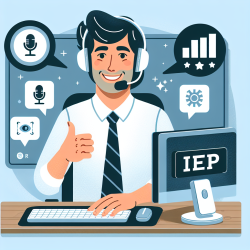As Speech Language Pathologists (SLPs), we play a pivotal role in the educational development of our students, especially when it comes to Individualized Education Program (IEP) planning and meetings. The transition to online therapy has transformed how we approach these responsibilities, offering both new opportunities and challenges. Whether you're new to online therapy jobs or a seasoned professional seeking to refine your approach, understanding how to effectively participate in IEP planning and meetings in a virtual environment is crucial. Let's explore strategies to ensure you feel content and informed throughout this process.
Understanding the IEP Landscape in Online Therapy
Firstly, it's important to grasp the unique aspects of online therapy in the context of IEP planning. Online therapy jobs often require SLPs to work with students from diverse backgrounds and with varying needs, all through a computer screen. This means developing a keen eye for observing students' non-verbal cues and an ability to engage them effectively in a virtual setting. Familiarizing yourself with the digital tools and platforms available for assessments and therapy sessions will enhance your ability to contribute meaningfully to IEP discussions.
Effective Communication in a Virtual Setting
Communication is the cornerstone of successful IEP planning and meetings. In an online setting, this involves not just direct interaction with students, but also with parents, teachers, and other professionals. Establishing a clear, empathetic, and consistent communication channel is vital. Utilize emails, video calls, and secure messaging platforms to share observations, progress reports, and any concerns. Remember, your ability to convey information clearly and compassionately can significantly influence the child's educational journey.
Collaboration and Teamwork Online
IEP meetings are collaborative by nature, involving a team of professionals working towards the common goal of supporting the student's educational growth. In an online environment, fostering a sense of teamwork can be challenging but not impossible. Prior to IEP meetings, reach out to team members to discuss the student's progress and any recommendations you have. During meetings, encourage open dialogue and be prepared to offer insights into how speech therapy can be integrated into the student's overall educational plan. This collaborative spirit is essential for creating a comprehensive and effective IEP.
Documentation and Data Sharing
Accurate documentation and data sharing are critical components of IEP planning. Online therapy platforms often come equipped with tools for tracking students' progress, session notes, and assessment results. Leverage these tools to maintain detailed records that can inform IEP discussions. Before meetings, organize your data and prepare to share specific examples of the student's progress or areas of need. This evidence-based approach will contribute to more informed decision-making and goal setting during the IEP process.
Engaging Parents and Caregivers
Parents and caregivers are integral to the success of any IEP plan. In an online therapy context, engaging them can require extra effort but is incredibly rewarding. Provide clear guidance on how they can support their child's learning and speech development at home. Offer regular updates on their child's progress and invite them to share their observations and concerns. This partnership not only enriches the IEP process but also empowers parents and caregivers to be active participants in their child's education.
Staying Informed and Continuing Education
The field of speech-language pathology, especially within the realm of online therapy, is ever-evolving. Staying informed about the latest research, tools, and strategies is crucial for effective IEP planning and meetings. Take advantage of professional development opportunities, webinars, and online courses. Engaging with a community of online SLPs can also provide valuable insights and support as you navigate the complexities of IEP planning in a virtual environment.
Conclusion
IEP planning and meetings are critical components of our work as Speech Language Pathologists, offering a structured framework to support our students' educational journeys. Embracing the unique aspects of online therapy can enhance our ability to contribute effectively to this process. By focusing on communication, collaboration, documentation, and ongoing education, we can overcome the challenges of the virtual environment and make a significant impact on our students' lives. Let's continue to learn, adapt, and thrive as online SLPs, ensuring every child receives the support they need to succeed.










